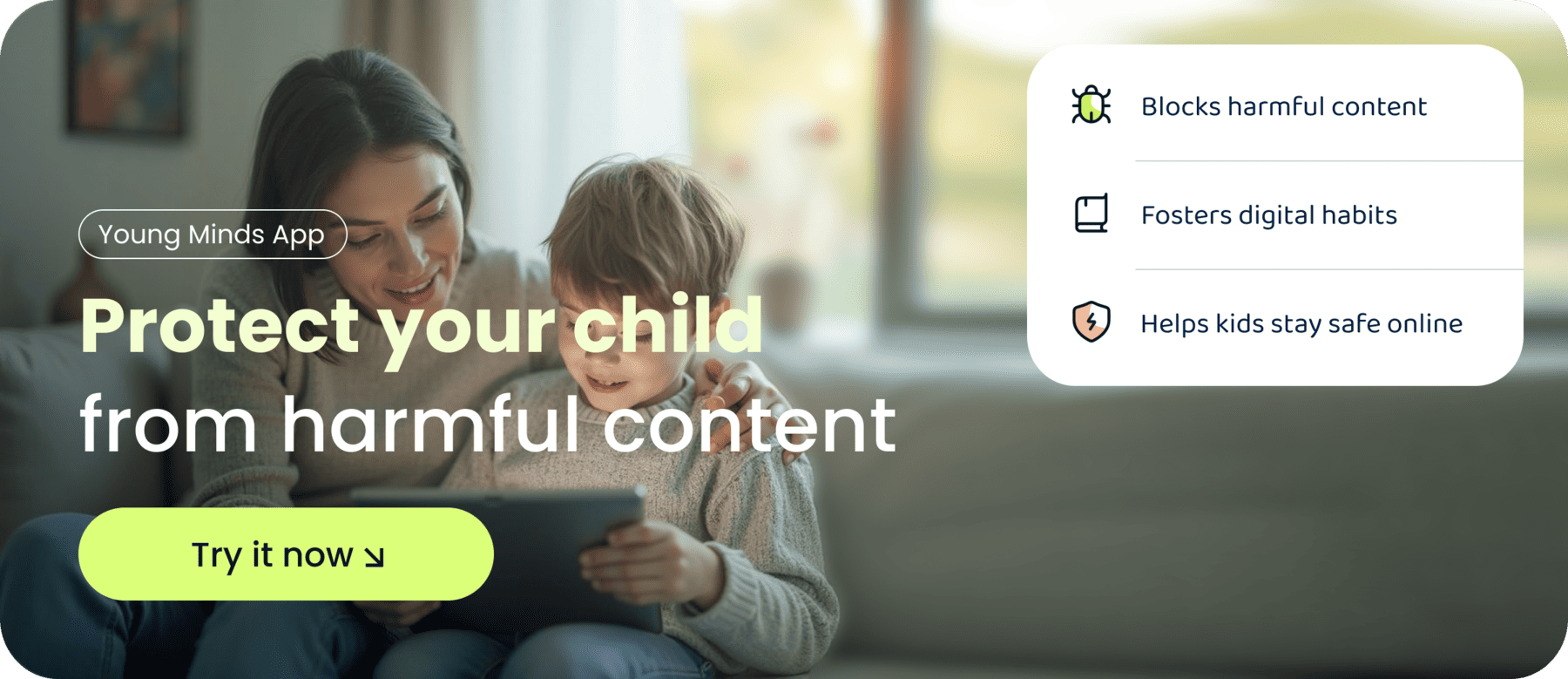Why Screen-Free Time Matters More Than Ever
Screens are woven into nearly every part of childhood today, from video lessons and YouTube crafts to online games with friends. They educate, entertain, and connect. But they can also overwhelm.
In the UK, children between 5 and 16 now spend an average of 6.3 hours a day on screens, according to Ofcom research. And while not all screen time is “bad,” too much of it, especially without guidance, can limit creativity, physical activity, and real-world social interaction.
At Young Minds App, we believe digital wellbeing isn’t about banning screens. It’s about building balance. Screen-free activities aren’t a rejection of technology, they’re a reminder that offline moments matter too. They help children develop focus, empathy, curiosity, and resilience, the very qualities they’ll need to thrive in a connected world.
What Does “Screen-Free” Really Mean?
“Screen-free” doesn’t have to mean “tech-free.” It’s about intentional time away from digital stimulation, moments when a child’s imagination takes the lead.
For example, a family walk, creative art project, or even helping to cook dinner are all forms of learning that don’t rely on pixels. The goal is to encourage active engagement over passive consumption.
At Young Minds App, we help families shift from control-based parenting (“No screens allowed!”) to growth-based parenting, where children learn why balance matters and how to make those decisions independently.
The Benefits of Screen-Free Activities
1. Builds Imagination and Problem-Solving Skills
When children play without screens, they create their own rules and stories. This kind of open-ended play stimulates creativity and independent thinking — essential skills for innovation later in life.
2. Improves Focus and Emotional Regulation
Offline play helps reset the brain. Activities like drawing, puzzles, or gardening allow kids to calm overstimulated minds and strengthen attention spans.
3. Encourages Family Bonding
Shared screen-free activities, cooking, board games, or weekend hikes, rebuild connection. It’s about shared laughter, teamwork, and conversation.
4. Promotes Physical Health
Outdoor play and movement-based games encourage stronger muscles, better sleep, and reduced stress, all crucial for growing bodies and minds.
5. Fosters Digital Awareness
Screen-free moments teach children that devices are tools, not crutches. When combined with guided digital education (as Young Minds provides), kids learn to manage screens responsibly rather than reactively.
30 Engaging Screen-Free Activities for Kids
Let’s explore creative, age-appropriate ideas you can introduce at home or outdoors.
Ages 3–6: Early Explorers
At this age, curiosity runs wild. The goal is sensory play and imagination.
- Nature Treasure Hunt – Collect leaves, pinecones, and pebbles; identify them in a mini nature book.
- Kitchen Helpers – Stir, pour, and mix simple recipes, learning through taste and touch.
- Storytime Theatre – Act out fairy tales using soft toys or homemade puppets.
- Shape Safari – Spot geometric shapes in everyday objects.
- Sensory Boxes – Fill tubs with rice, pasta, or sand and let kids dig for “hidden treasures.”
- Bubble Chase – A timeless outdoor game for laughter and coordination.
Ages 7–10: Creative Builders
These years are ideal for fostering teamwork, exploration, and problem-solving.
- Build a Blanket Fort – A creative space for reading, journaling, or quiet time.
- Mini Gardening Project – Plant seeds and track growth over weeks.
- Homemade Board Game – Design and test a new family board game.
- Craft From Nature – Paint stones, press leaves, or create twig frames.
- Family Story Chain – Each person adds a sentence, let the story unfold naturally.
- Cooking Challenge – Give your child a simple dish to lead, like pancakes or sandwiches.

Ages 11–13: Independent Thinkers
Pre-teens crave autonomy. The goal is to channel that independence constructively.
- Journal of Discovery – Write daily reflections or gratitude notes.
- DIY Science Projects – From vinegar volcanos to paper circuits.
- Photo Adventure – Use a disposable or instant camera to capture nature, not selfies.
- Volunteering Together – Local park clean-ups or charity drives build empathy.
- Upcycle Workshop – Turn old jars or clothes into something new.
Ages 14+: The Growth Years
Teens need purposeful activities that reinforce balance, leadership, and mindfulness.
- Fitness Challenge – Choose personal fitness goals: cycling, hiking, or yoga.
- Creative Clubs – Drama, art, or writing groups promote belonging and self-expression.
- Mindful Journaling – Reflect on emotions, goals, and gratitude.
- Entrepreneur for a Day – Launch a mini project: bake sale, tutoring, or pet-sitting.
- DIY Repair Workshop – Fixing broken toys or furniture teaches resourcefulness.
- Tech-Free Family Evenings – Everyone, including parents, puts devices away.
Family Favourites (All Ages)
- Board Game Night – From Monopoly to Cluedo, timeless bonding.
- Cooking Together – Try new cuisines and assign family roles.
- Picnic Adventure – Explore a new park or nature trail.
- DIY Puppet Show – Children direct; parents perform.
- Charity Challenge – Choose a cause and plan a fundraising day.
- Art Wall at Home – Dedicate a space to display family artwork.
- Digital Detox Sunday – A full day offline, enjoying connection without distraction.
How to Encourage Screen-Free Time (Without Resistance)
Even the best ideas fall flat if children resist the change. Here’s how to introduce screen-free moments positively:
1. Explain the “Why,” Not Just the Rule
Children respond better when they understand purpose. Explain how offline play helps their brains rest, grow, and imagine.
2. Model Balance Yourself
Your habits set the tone. Show your child that adults also need breaks from screens.
3. Create Predictable Routines
Set consistent “unplug hours”, e.g., during meals or before bedtime.
4. Make Screen-Free Time Rewarding
At Young Minds App, we encourage motivated discipline: children earn screen time by completing learning milestones or healthy habits.
5. Focus on Connection, Not Control
The goal isn’t to enforce silence, it’s to replace scrolling with shared experiences that build trust.
How the Young Minds App Supports Healthy Digital Habits
The Young Minds App helps families make sense of the digital world together. Instead of just blocking apps or limiting hours, it teaches balance.
Our approach combines three pillars:
- Education through Exploration – Interactive lessons that help children understand what healthy digital choices look like.
- Safety with Understanding – Smart filters protect kids from harmful content while explaining why boundaries exist.
- Discipline through Motivation – Guided modes (Study, Wind Down, Bedtime) teach structure,and reward independence.
Through playful learning and positive reinforcement, families build not just better habits, but stronger relationships.
The Bigger Picture: Raising Digitally Ready Children
The truth is, screens aren’t going anywhere. The challenge for modern parents isn’t to eliminate technology, but to equip children with the wisdom to use it well.
Every time your child paints, explores, or builds something offline, they’re learning patience, problem-solving, and focus. These are the very skills that will later help them navigate the digital world with confidence.
At Young Minds, we call this digital readiness. It’s the bridge between safety and freedom, helping families grow stronger, online and offline.
Final Thoughts
Screen-free activities aren’t just about keeping kids busy. They’re about creating moments that matter, shared laughter, creativity, and discovery.
When families prioritise real-world connection, children learn that screens are just one small part of a bigger, richer life.
So, the next time you’re planning your weekend, try one of these 30 ideas. You’ll be surprised by what your child can imagine, create, and feel, without ever opening a screen.
Parents Also Ask:
Why are screen-free activities important for kids?
Screen-free activities help children develop creativity, focus, and emotional regulation. They balance the fast pace of digital life with real-world learning. Offline play encourages imagination, teamwork, and problem-solving — essential life skills that can’t be built through screens alone.
How much screen-free time should children have each day?
There’s no single “magic number,” but experts recommend at least one to two hours of screen-free time daily for primary-aged children. The key is creating structured balance, alternating between online learning and offline exploration.
Are screen-free activities still relevant in a digital world?
Absolutely. The goal isn’t to remove technology — it’s to build readiness.
Children who can enjoy both digital and physical experiences grow into more balanced, independent thinkers. Screen-free activities help children learn how to switch off, recharge, and self-regulate — vital skills in today’s connected society.





